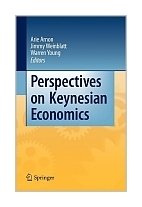|
||
• wydawnictwa polskie
• Zamów informacje o nowościach z wybranego tematu • kontakt
• Cookies na stronie |
PERSPECTIVES ON KEYNESIAN ECONOMICSARNON A. WEINBLATT J. YOUNG W. EDITORSwydawnictwo: SPRINGER , rok wydania 2010, wydanie Icena netto: net price + 5% vat. This book combines historical and policy-oriented perspectives on the relevance of the Keynesian approach for economic theory, policy, and crisis analysis. The first part focuses on historical, theoretical, and methodological issues,
and puts them in context with current developments. The second part focuses on the
application of the Keynesian approach to modeling the economy, policy-making, and
analyzing the ongoing crisis of the early 21st century. One of the book’s most essential features are the commentaries on the papers, which promote a cross-fertilization between macroeconomists and historians of economics, providing, in conjunction with the papers themselves, a balanced outlook on the current relevance of Keynesian economics. Table of Contents Introduction.- Part I: History, Methodology, and their Current Relevance. - Making the Most of Anomaly in the History of Economic Thought: Smith, Marx-Engels, and Keynes. - Reason and Reasonableness: Lessons from "The Economic Consequences of the Peace" Ninety Years Later. - The Marshallian Roots of Keynes. - Was Patinkin a Keynesian Economist?. - Keynes, Robbins, and the Nature of Economics. - Keynesianism at Chicago: 1959-1977. Part II: Models, Pedagogy, Policy, and Crisis. - The Keynesian Revolution and IS-LM. - The Keynesian Method, Complexity, and the Training of Economists. - Keynes, Wicksell, and Active Monetary Policy. - The Consequences to the Banks of the Collapse of Money Values, 1931 and 2009. - The Great Depression, the Current Crisis, and Old vs. New Keynesian Thinking: What have we Learned and What Remains to be Learned. - Lucas, Keynes, and the Current Crisis. 320 pages, Hardcover Księgarnia nie działa. Nie odpowiadamy na pytania i nie realizujemy zamówien. Do odwolania !. |


